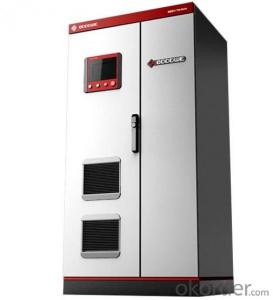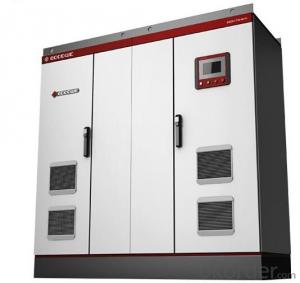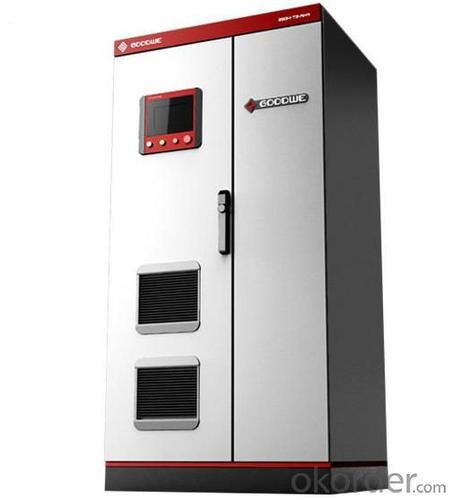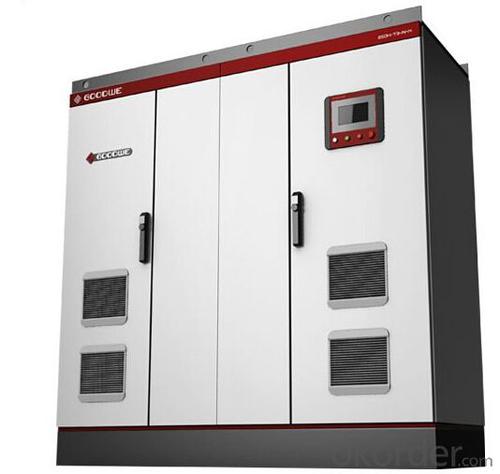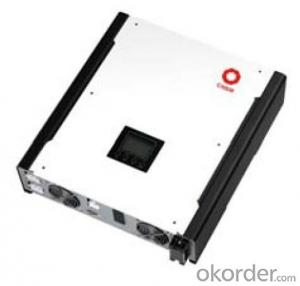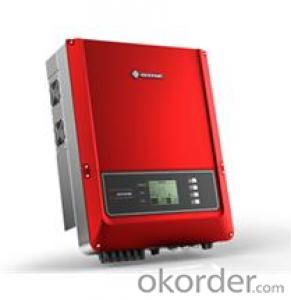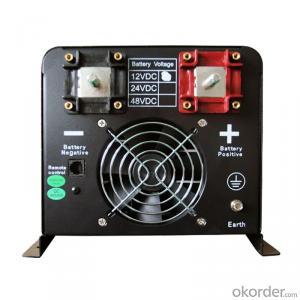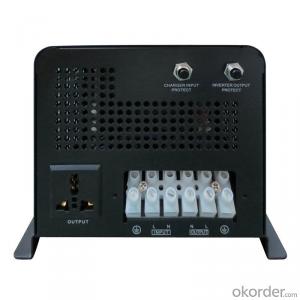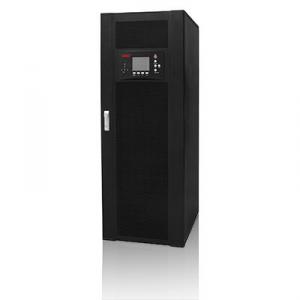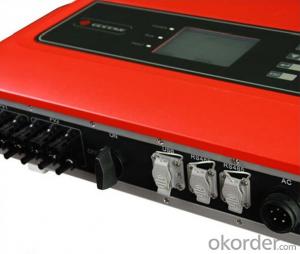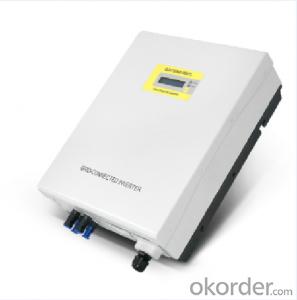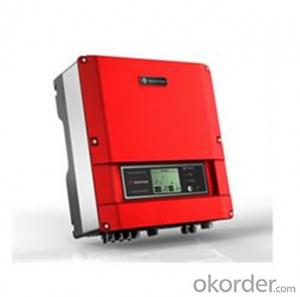12V Solar Inverter GW500K-MTL On Grid Solar Inverter
OKorder Service Pledge
OKorder Financial Service
You Might Also Like
Central solar inverter GW500K-MTL solar inverter is widely used in large-scale solar power plants. As core equipment in solar power station, its stability and reliability play an important role in long-term investment returns. GW500K-MTL solar inverter adopts industrial design philosophy as well as proven inverter control technology, which ensures its 25 years life time. In terms of solar plants grid integration, GoodWe solar inverter is also equipped with output power liner control, SVG reactive power compensation technology, LVRT capability and other advanced technologies which are apt to grid integration and management. In addition, its lower THDi output and higher conversion efficiency provide stronger support to green and efficient power plants operation.
Datasheet
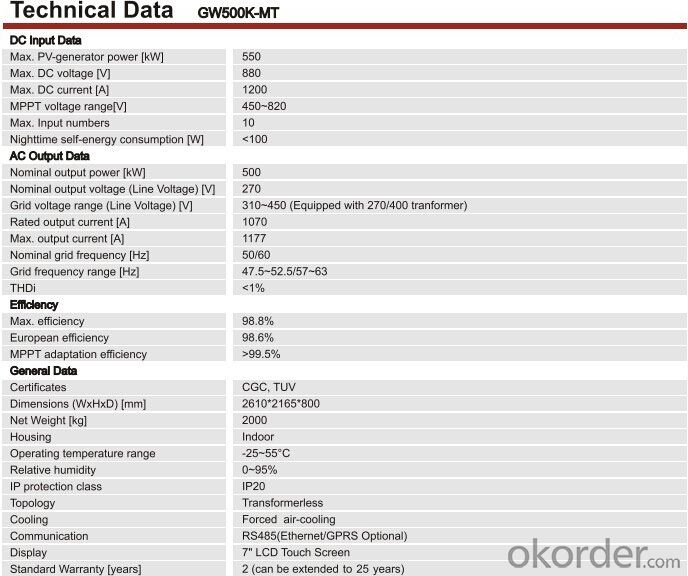
- Q: What is the impact of temperature on the performance of a solar inverter?
- The impact of temperature on the performance of a solar inverter is significant. High temperatures can cause the efficiency of the inverter to decrease, resulting in a reduction in power output. This is due to the fact that electronic components inside the inverter operate less efficiently at high temperatures. Additionally, elevated temperatures can lead to increased thermal stress on the inverter, potentially shortening its lifespan. Therefore, it is important to carefully consider the temperature conditions and provide adequate cooling or ventilation for optimal performance and longevity of the solar inverter.
- Q: Can a solar inverter be used with solar-powered recreational vehicles (RVs)?
- Yes, a solar inverter can be used with solar-powered recreational vehicles (RVs). Solar inverters convert the direct current (DC) generated by the solar panels into alternating current (AC) that can be used to power various appliances and devices in the RV. This allows RV owners to utilize solar energy for their electrical needs while on the road.
- Q: How does a solar inverter impact the payback period of a solar system?
- A solar inverter can have a significant impact on the payback period of a solar system. The efficiency and reliability of a solar inverter can affect the overall energy production and performance of the solar system. A high-quality inverter can optimize the conversion of solar energy into usable electricity, maximizing the system's output and reducing energy losses. This improved efficiency can shorten the payback period by increasing the amount of electricity generated and therefore the savings on utility bills. Additionally, a reliable inverter can minimize maintenance and replacement costs, further enhancing the financial returns of the solar investment.
- Q: What is the role of a solar inverter in preventing system downtime?
- The role of a solar inverter in preventing system downtime is to efficiently convert the DC power generated by solar panels into AC power that can be used by electrical devices. It ensures the smooth operation of the solar power system by regulating the flow of electricity, monitoring voltage levels, and protecting against potential issues such as overloading or short circuits. By maintaining a stable and reliable power supply, the solar inverter plays a crucial role in minimizing system failures and downtime.
- Q: Can a solar inverter be used with different types of solar panels (monocrystalline, polycrystalline, thin-film)?
- Yes, a solar inverter can be used with different types of solar panels, including monocrystalline, polycrystalline, and thin-film. The key factor is that the solar panels need to have compatible voltage and current ratings with the inverter. As long as the specifications match, the inverter can efficiently convert the DC power generated by any of these solar panel types into usable AC power for various applications.
- Q: Can a solar inverter be used with building-integrated photovoltaic systems?
- Yes, a solar inverter can be used with building-integrated photovoltaic (BIPV) systems. Solar inverters are an essential component of any photovoltaic system, including BIPV systems. They are responsible for converting the direct current (DC) generated by the solar panels into alternating current (AC) that can be used to power electrical devices in buildings. Therefore, a solar inverter is necessary to ensure the seamless integration of BIPV systems with the electrical grid and the effective utilization of solar energy.
- Q: How does the input voltage rating affect the performance of a solar inverter?
- The input voltage rating of a solar inverter directly affects its performance. The inverter is designed to convert the DC power generated by the solar panels into AC power that can be used in homes or businesses. If the input voltage exceeds the rating of the inverter, it can cause damage to the electronics and reduce its efficiency. On the other hand, if the input voltage is too low, the inverter might not be able to operate at its full capacity. Therefore, it is crucial to choose an inverter with an input voltage rating that matches the specifications of the solar panels to ensure optimal performance and longevity.
- Q: How does a solar inverter protect against short circuits?
- A solar inverter protects against short circuits by incorporating protective devices such as fuses or circuit breakers in its design. These protective devices are designed to detect high current flow caused by a short circuit and quickly interrupt the circuit, preventing any damage or overheating that could occur. Additionally, advanced solar inverters may also include built-in monitoring systems that constantly monitor the electrical parameters and shut down the inverter in case of a short circuit to ensure safety and prevent further damage.
- Q: Can a solar inverter be used with a solar-powered security camera system?
- Yes, a solar inverter can be used with a solar-powered security camera system. The solar inverter converts the DC (direct current) power generated by the solar panels into AC (alternating current) power, which can be used to power the security camera system. This setup allows for continuous and uninterrupted power supply to the security cameras, making them fully operational and independent of the electrical grid.
- Q: How does a solar inverter handle voltage dip and interruption?
- A solar inverter handles voltage dip and interruption by continuously monitoring the electricity supply from the solar panels. In the event of a voltage dip or interruption, the inverter immediately adjusts its output voltage to match the required level, thereby stabilizing the power supply to connected devices. Additionally, some advanced solar inverters are equipped with built-in energy storage systems, such as batteries, which seamlessly take over during voltage dips or interruptions, ensuring uninterrupted power supply.
Send your message to us
12V Solar Inverter GW500K-MTL On Grid Solar Inverter
OKorder Service Pledge
OKorder Financial Service
Similar products
Hot products
Hot Searches
Related keywords
